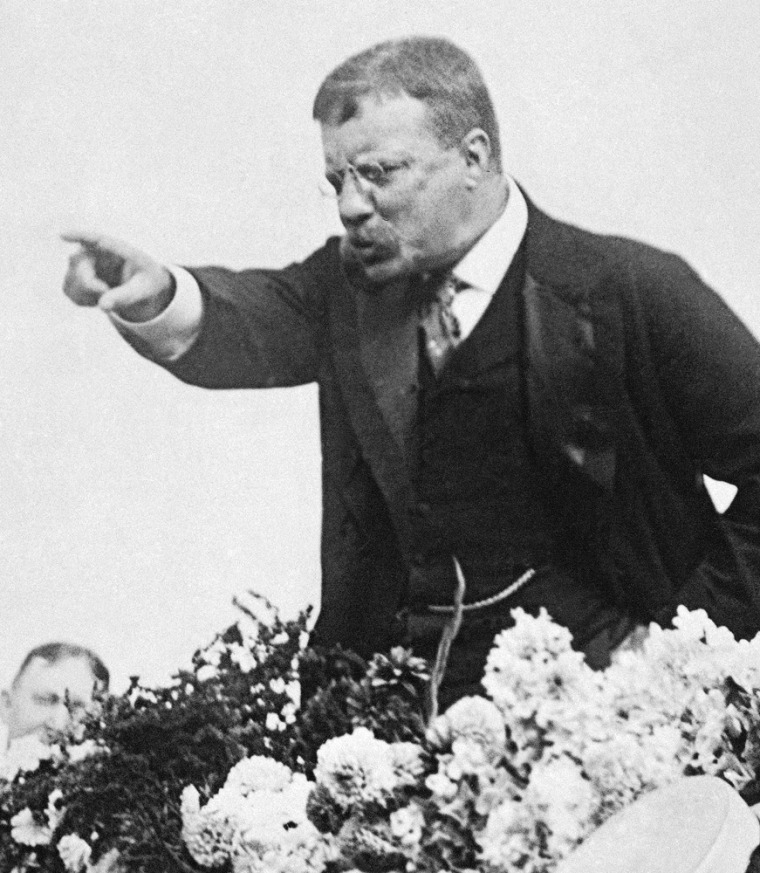WASHINGTON — The Norwegian Nobel Committee's decision Friday to award Al Gore, along with the U.N.'s Intergovernmental Panel on Climate Change, the 2007 Nobel Peace Prize is certain to delight Gore admirers, who hope the recognition will persuade the former vice president to jump into the presidential race.
But the record of the American politicians who have won the Peace Prize since it was first handed out in 1901 shows that if you win, it’s an indication that your peak has passed.
Theodore Roosevelt, the one American Peace Prize winner who tried to stage a political comeback, failed.
The list of previous American winners is dominated by politicians and statesmen whose careers in public office had ended or were soon to end: Jimmy Carter in 2002, Secretary of State Henry Kissinger in 1973, former Secretary of State George Marshall in 1953, and Vice President Charles G. Dawes in 1925.
The first American to win
Roosevelt became the very first American to win the prize when the Nobel Committee honored him in 1906.
Roosevelt won for bringing together the Japanese and the Russians at Portsmouth, N.H., to negotiate an end to the Russo-Japanese war.
He could have run for another term in 1908, but stepped aside for his preferred successor, William Howard Taft.
Dismayed by Taft’s performance as president, Roosevelt mounted a third-party effort to win back the White House in 1912. He carried six states and lost to Democrat Woodrow Wilson.
Wilson went on to win the Nobel himself in 1919, at the end of his second term as president.
By that point, Wilson was a shattered man, both politically and physically, having suffered a stroke after his failed effort to get the Senate to ratify the Treaty of Versailles.
The United States never joined Wilson’s League of Nations. To the dismay of Wilsonian internationalists, America turned inward in the 1930s, and Japan and Germany launched wars of aggression.
Noble idealism
The record of American winners of the Peace Prize is replete with statesmen who pushed noble, idealistic projects, but later saw their hopes rebuffed and destroyed.
Former Secretary of State Frank Kellogg won in 1929 for proposing the Kellogg-Briand Pact "condemning war and renouncing it as an instrument of national policy."
Fifteen nations signed the pact, including Japan and Germany, and most of them went to war with each other just ten years later.
But past isn’t necessarily prologue. Gore needn’t be deterred by the over-the-hill precedent of previous American winners. Healthy at age 59, he’s not a bitter, enfeebled recluse as Wilson was in 1920.
His political career may only be interrupted, not ended. Or at least so his admirers hope.
The 'draft Gore' movement
In a full-page ad in the New York Times Wednesday a group called DraftGore.com told Gore, “Only from the Oval Office can you wield the kind of influence needed to move countries, policies and corporations to bring about meaningful change” on the global warming issue he has addressed so often.
Some are urging Gore to see the prize as his signal to run.
Christopher Hitchens wrote on Slate.com that if Gore did win the Nobel and then chose not to run, “he would retrospectively abolish all the credit he has acquired so far. It would mean in effect that he never had the stuff to do the job and that those who worked and voted for him were wasting their time.”
But Gore's victory in the “Norwegian primary” in Oslo Friday morning doesn’t necessarily mean that he would be a favorite of voters in swing states such as Missouri and Colorado in the 2008 election.
As Geir Lundestad, Secretary of the Norwegian Nobel Committee wrote a few years back, the selections of the committee reflect “Norwegian definitions of the broader, Western values of an idealist, the often slightly left-of-center kind, but rarely so far left that the choices were not acceptable to Western liberal-internationalist opinion in general.”
Gore already has a lot of admirers in the “slightly left-of-center… liberal-internationalist” voter group. In the 2000 election, exit polling showed that he won four of five self-described liberal voters.
But if you look at the voter groups among which Gore under-performed in the 2000 election, compared to Bill Clinton in 1992 and ‘96, they were the kind of people who wouldn’t necessarily be impressed by the dazzling 24-karat gold of the Nobel Peace Prize.
According to 2000 exit poll interviews with voters, here’s how Gore did with problematic segments of the electorate for Democrats:
- White men: 36 percent
- Married men: 38 percent
- Men with some college education, but who never graduated: 40 percent
- Southern white voters: 31 percent
- Rural voters: 37 percent
- People who attend church at least once a week: 39 percent
This data may not dissuade Democratic primary voters if Gore runs for president.
Not longing in Colorado
But one pollster in a battleground state voiced skepticism. “I don’t see a body of people here longing for something fresh” in the Democratic race, said Denver-based pollster Floyd Ciruli Thursday before the prize was announced.
Winning the Nobel “would be a great thing for Gore, if we were still debating ‘will Gore get in?’ But there’s simply no discussion” that Ciruli has heard recently among Colorado Democrats of the prospect of Gore jumping in the race.
Ciruli’s latest survey of Colorado Democrats puts Sen. Hillary Clinton in the lead with 29 percent, trailed by John Edwards and Sen. Barack Obama, each with 23 percent.
